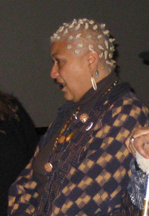Jewelle Gomez facts for kids
Quick facts for kids
Jewelle Gomez
|
|
|---|---|

Gomez in 2008
|
|
| Born |
Jewelle Lydia Gomez
September 11, 1948 Boston, Massachusetts, U.S.
|
| Occupation | Writer, critic |
|
Notable work
|
The Gilda Stories |
| Spouse(s) | Diane Sabin, m. 2008 |
Jewelle Lydia Gomez (born September 11, 1948) is an American author, poet, critic, and playwright. For 22 years, she lived in New York City, where she worked in television and theater. She later moved to the West Coast.
Her writing includes fiction, poetry, and essays. Much of her work explores the experiences of women, especially LGBTQ women of color. Gomez has also been interviewed for several documentaries about LGBT rights and culture.
Contents
Early Life and Influences
Jewelle Gomez was born in Boston, Massachusetts. Her mother, Dolores Minor LeClaire, was a nurse, and her father, John Gomez, was a bartender. Gomez was raised by her great-grandmother, Grace.
Grace was born on Native land in Iowa. She had an African-American mother and an Ioway father. Grace's husband, John E. Morandus, was part-Black and part-Wampanoag. He was related to the famous leader Massasoit.
Growing up in the 1950s and 1960s, Gomez was greatly influenced by her great-grandmother Grace and her grandmother Lydia. She often writes about them in her work. During her school years, Gomez became involved in Black political movements, which also shaped her writing.
A Career in Writing
Gomez is an award-winning author of seven books. She has described herself as a possible "foremother of Afrofuturism"—a genre that mixes science fiction with African history and culture.
The Gilda Stories
Her most famous book is the novel The Gilda Stories, which won two Lambda Literary Awards. The book tells the adventure of a girl who escapes slavery in the 1800s and becomes a vampire. She lives for 200 years, and the story follows her journey through different time periods and communities.
Gomez also turned The Gilda Stories into a play called Bones and Ash. In 1996, the Urban Bush Women theater company took the play on tour to 13 cities across the United States.
Other Books and Plays
Gomez has written several other books. Don't Explain is a collection of short stories, and 43 Septembers is a book of essays about her personal and political thoughts. She also published Oral Tradition: Selected Poems Old and New.
Her work has appeared in over 100 collections, called anthologies. These include Dark Matter: A Century of Speculative Fiction from the African Diaspora and Daughters of Africa.
Gomez has also written plays. In 2010, she wrote Waiting For Giovanni, a play about the famous writer James Baldwin. Another play, Leaving the Blues, is about the singer Alberta Hunter and premiered in 2017. Her play Unpacking in Ptown premiered in 2024.
Writing for Magazines
For many years, Gomez wrote reviews of books and movies for publications like The Village Voice, the San Francisco Chronicle, and Ms. magazine. She has said that The Village Voice was very important in helping her grow as a writer.
Activism and Community Work
Gomez has been a longtime activist for LGBTQ rights. Her activism is inspired by the history of race and gender in America. She believes that in the fight for freedom, no one should be left behind.
In 1968, she was part of the original staff of Say Brother (now called Basic Black), one of the first weekly TV shows about Black culture in the U.S. In 1984, she helped start the Gay and Lesbian Alliance Against Defamation (GLAAD), an organization that works to ensure fair and accurate representation of LGBTQ people in the media.
Supporting Women and LGBT Causes
Gomez has worked with foundations that give money to support women's groups and projects. She was on the boards of the Astraea Lesbian Foundation and the Open Meadows Foundation. She also helped create a group called 100 Lesbians and Our Friends, which raised over $200,000 for lesbian projects in two years.
Fighting for Marriage Equality
Gomez and her partner, Dr. Diane Sabin, were part of a group that sued the state of California for the right to legal marriage. In May 2008, the California Supreme Court ruled that same-sex couples had the right to marry. Gomez and Sabin were married that year, before a new law called Proposition 8 temporarily stopped same-sex marriages in the state.
A 2022 documentary film called Jewelle: A Just Vision explores Gomez's life as both an artist and an activist.
Professional Life
Gomez has had a long career in the arts and in philanthropy (the act of giving money to help others). She has worked for the New York State Council on the Arts and the San Francisco Arts Commission, where she helped give grants to artists and cultural groups.
She has taught at many colleges and universities, including Hunter College, Rutgers University, and San Francisco State University. She also served as the president of the San Francisco Public Library Commission.
 | Delilah Pierce |
 | Gordon Parks |
 | Augusta Savage |
 | Charles Ethan Porter |

